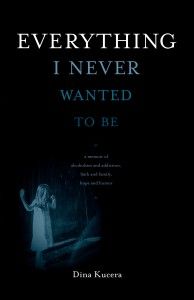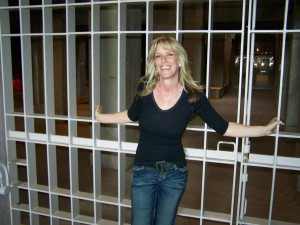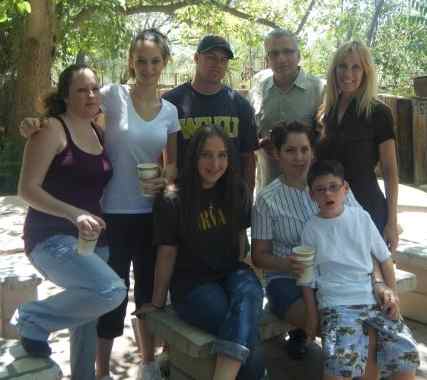 Synopsis:
Synopsis:
Dina Kucera is a stand-up comic. Reading a synopsis of her memoir, Everything I Never Wanted to Be, might make you wonder what she could possibly find funny about her life or her family’s problems and, therefore, where she gets material for her act. But the message of Everything I Never Wanted to Be is, in Kucera’s own words, that “with love and hope, anything is possible. It’s not easy . . . but possible.”
Kucera was raised in abject poverty in Albuquerque, New Mexico. She wanted to escape school, so made a deal with her science teacher. If she collected 50 bugs and displayed them on a poster board, the teacher agreed to give her a “D.” With straight “D’s,” she “graduated” from the ninth grade. Before long, she was pregnant with her first child, Jennifer. She lived with her parents and drove their van, delivering newspapers. Soon she was also joined by second daughter, April, as she completed her daily newspaper route.
She has also worked as a maid, bartender, waitress, and spent ten long, miserable years employed as a grocery store checker, primarily because the job provided stability for her family, as well as much-needed health insurance. With her second husband, John, to whom she has been married for twenty years, she had her youngest daughter, Carly. They all live in Phoenix, Arizona. Kucera cares not only for her mother, who has Parkinson’s disease and dementia, but April’s son, Moses, who has cerebral palsy.
Kucera is a recovering alcoholic. She has also battled her affinity for painkillers and endured the debilitating sorrow of seeing her own daughters battle alcoholism, drug addiction, self-harm (cutting), and abusive relationships. Through it all, Kucera never lost her faith, although she only recently resumed regular church membership.
Everything I Never Wanted to Be is a fascinating account of one family’s battle to survive.
Review:

Kucera’s story is both hysterically funny and completely heartbreaking. It’s a 204-page nail-biting, yet invigorating glimpse into one family’s journey through complete dysfunction, utter despair. And yet . . . they love each other, hold onto each other, have each other’s backs, and somehow manage to overcome each hurdle. So far. As Kucera makes clear, it is a one day at a time prospect. She talks about waves of good and bad times. The tide comes in, the tide goes out. Some days are better than others. Eventually the bad times pass and periods of joy and happiness resume. So is her family really so different from anyone else’s?
Have you noticed how I make all my addictions sound funny? They’re not funny, but that’s how I deal with it. If you have a better way to deal with it, you should write a book, too.
~~ Dina Kucera in Everything I Never Wanted to Be
Well . . . yes. In many ways, Kucera’s family is definitely unique. Her father was an alcoholic. One of six children, only one of her siblings has managed not to become an alcoholic. One of the most gut-wrenching childhood stories she relates involves her aborted effort to collect just one award. And she wasn’t even the only child upon whom the award was scheduled to be bestowed. Rather, the sugar cookie award was being given to each Girl Scout in her troop, but she never got to collect hers. En route to the meeting, her father parked her on a curb and went into a bar, coming out every hour or so to inquire if she was all right. She was seven, as she kept telling panhandlers who stopped and asked her for money.
Kucera’s eventual refusal to continue attending church with her family came about as a result of inappropriate behavior by the priest as a a teen-aged Kucera confessed. When she ran screaming from the church and told her parents what had happened, not only did they not believe her, they took her back to apologize to him. That she did not lose her faith entirely as a result of that incident is itself nothing short of a miracle, although it did take her years to figure out that it was the idea of church in general that she didn’t believe in. “God was a separate idea.” Eventually, she decided that the “Divine Order” refers to the fact that everything in your life is exactly as it is meant to be, conceptualizing the Divine Order as a goal. “Move toward the things in life that are good and kind and loving. And that may be the best we can do,” she writes.

Kucera’s writing is emotionally raw, her verbiage coarse. Often, the book reads almost like stream of consciousness ramblings because she does not relate the details of her family’s journey in a chronological, linear fashion. Rather, she strings together vignettes as they apparently meld together in her own memory bank, sometimes writing in past and other times in present tense. Always with her quirky, often self-deprecating sense of humor.
The best way to know if you’re making the right decision as a parent is to ask people who don’t have children. For some reason these people have the answer for every situation. They would do this, or they would do that. This wouldn’t have happened if you had done it this way. They’re the same people who say, “I don’t have any children, but I completely understand because I have a cat.”
Let me explain this loud and clear: having a car or a dog or a yak is nothing like having a child. you will never have to pay for drug rehab for your yak. I could not put my child in a create while I went to work. Actually, I could have, and looking back, I probably should have. But it’s illegal.
What is clear is that Kucera, despite all of her shortcomings — for which she feels plenty of remorse — loves her family and is determined to see them thrive. She would lay down her life for her daughters and, in fact, it’s come close to that more than once. She details her own addictions and unraveling under the weight of caring for all of them, trying to keep her girls, especially Carly, alive. What keeps Kucera from giving up? “[S]ometimes when I look at Carly and she smiles or laughs really hard, I see that little girl again. Just for a second, I remember. And it makes my heart happy.” Every parent knows precisely what Kucera means.
This is not a “happily ever after” story. As Everything I Never Wanted to Be draws to a close, Kucera has taken a leap of faith and quit her grocery checker job to write the book. Carly has left rehab and remained clean for six months, but April is still drinking. Kucera continues to care for her mother, and Moses, a very special little boy, is the light of all of their lives. Just like your family, mine, and every other family you know, they are carrying on. That’s all any of us can do.



11 Comments
[New Post] Book Review: Everything I Never Wanted to Be https://www.jhsiess.com/2010/11/23/everyt…
I just read another review of this. This is a book which I will find difficult to read.
Thank you so, so much for the beautiful review:) Have an amazing holiday!!!! Dina Kucera:)
Wow, what an amazing story! I love memoirs, and think I need to look for this one.
I like the story from the review i just read. Only change is constant int his world. Also, in everything we do there should be love. =)
What a wonderful review; seriously … Although I haven’t been addicted, some of my family members went that route, and it is heart-wrenching to see someone you love turning into someone you don’t know. I applaud this author for her bravery in slogging it out and keeping the faith in spite of the hardships. I know that there are many more people with stories like these who can barely make themselves get up in the morning. Kudos to Ms. Kucera. This book is going on my Goodreads to-buy list!
Wow, this sounds like an inspirational story, although a very heart-breaking one too! Great review 🙂
Wow! What a story of heartache and loss, yet how wonderful that her life has turned around. Thank so much for this review!
This does sound like a wonderful read. I’m glad Dina’s family is loving and intact, despite their hardships. You’re right…every family has them to one degree or another. I love her description of the good and bad times being like the tide…so true!
I enjoyed your thoughtful review.
Pingback: Saturday Review of Books: November 27, 2010 | Semicolon
Pingback: Saturday Review of Books: December 4, 2010 | Semicolon